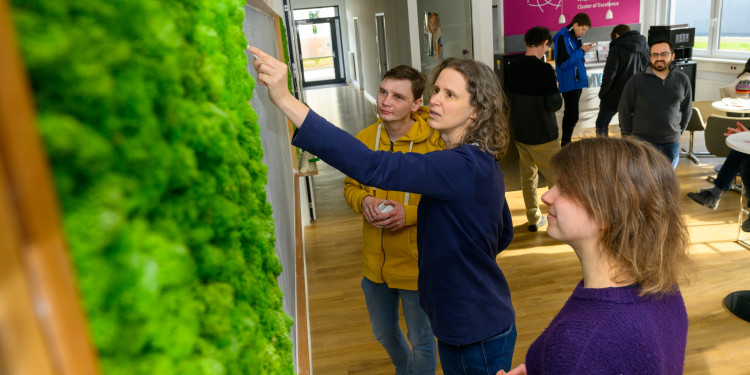
Mathematics driving innovation
Mathematics is one of the foundations of scientific and economic progress, essential for a great number of disciplines. In order to cope with the complex challenges facing our world, we need high-powered mathematical methods which cross over the boundaries between traditional areas of mathematics. It is precisely here that the Cluster of Excellence “Mathematics Münster: Dynamics – Geometry – Structure” comes into play – with a research programme which creates innovative new perspectives.
The research being undertaken is driven by around 200 researchers. Here are some examples which show clearly the range and the innovative strength of their work:
Analogies and method transfer: Prof. Thomas Nikolaus is researching into arithmetical cohomology theory. Using topological methods, an area which deals with geometry and deformations, he aims to transfer his findings to algebra and number theory, where the abstract properties of numbers, as well as integer solutions for equations, are studied. It is in this field that Prof. Eva Viehmann was awarded the Leibniz Prize this year. Work carried out by Thomas Nikolaus and Fields Medal winner Peter Scholze recently created the basis for this method transfer.
Interdisciplinarity: It is in mathematical physics that the extent of interdisciplinary collaboration is shown. Prof. Gustav Holzegel, who came to Münster in 2020 on the basis of an Alexander von Humboldt professorship, heads a team which is looking at mathematical aspects of the General Theory of Relativity. For this purpose, methods from differential geometry, the theory of partial differential equations, harmonic analysis and mathematical physics are all combined in order, for example, to gain a mathematical understanding of the stability of black holes.
Mathematics in medicine: Prof. Benedikt Wirth is working on mathematical methods of medical imaging. The aim is to make it possible to follow individual cells as they move through the body and, as a result, arrive at a better understanding of the courses which diseases take. Prof. Angela Stevens is developing new mathematical models to describe regeneration processes in cell biology and in infection processes in medicine. Mathematical modelling is becoming increasingly important for understanding biological and medical processes.
New paradigms: The use of non-linear methods of machine learning is currently revolutionising the approximation of high-dimensional partial differential equations. Prof. Arnulf Jentzen recently arrived at an important result by beating the “curse of dimensionality”. His work paves the way for further research, for example in finance.
Simulation and open-source software: Prof. Mario Ohlberger and his team are developing efficient approaches to real-time simulations. These can be transferred to a large class of real problems and, as a result, can have applications in the simulation of batteries or catalytic filters. Such innovative numerical methods can be used in industrial applications by means of relevant open-source software.

Prof. Thomas Nikolaus is Professor of Theoretical Mathematics at the Institute of Mathematics. Prof. Mario Ohlberger is Professor of Applied Mathematics at the Institute of Numerical and Applied Mathematics. They are both spokespersons for the “Mathematics Münster” Cluster of Excellence.
Facts & Figures: “Mathematics Münster: Dynamics – Geometry – Structure” Cluster of Excellence
- Set up in 2019
- Mathematics Münster advances cutting-edge research by implementing integrated approaches to solve fundamental problems across various mathematical disciplines. These approaches combine different techniques, perspectives, or fields of expertise to address challenges comprehensively.
- Focus on ten research topics, each of which incorporates several fields of mathematics and which are organised in three main overarching areas: Invariants and Foundations; Non-linear Spaces and Operators; and Models, Approximations and Data.
- Around 200 members, with 50 investigators and 150 researchers on international graduate and postdoc programmes.
- “Centre of Mathematics Münster” (CMM) research centre to be opened in 2026 at Coesfelder Kreuz
- Total funding of 25 million euros from 2019 to 2025
This article is from the University newspaper wissen|leben No. 5, 17 July 2024.
Further information
- “Mathematics Münster: Dynamics – Geometry – Structure” Cluster of Excellence
- Another article on the topic page: Vice-Rector Prof Monika Stoll on the Excellence Strategy
- Another article on the topic page: Guest article by “Religion and Politics” Cluster of Excellence
- The July issue of the University newspaper as PDF (only in German)
- All issues of the university newspaper at a glance (only in German)
